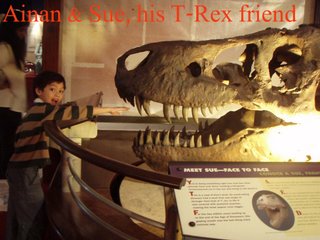Is genius prophetic?
Ainan Celeste Cawley is my six year old son. I have been accustomed in these six years to being surprised by him, but as is the way of it, being accustomed to it, means I am no longer surprised. Sometimes, however, I find myself being so, despite having come to expect the surprising from him.
Six months ago, Ainan said to me that he thought that instead of cars, you could have vehicles propelled by pure radiation. His reasoning went thus: "Dad, light is made of particles and they move very fast and so, if they move away from the vehicle, at the speed light, it should, according to Newton's Laws, push the vehicle in the opposite direction."
Now, I had not taught him any physics - and there were - and are - no physics textbooks (yet) in the house. But he had somehow acquired an understanding of Newton's Laws and deduced that light, being particulate in character in some sense (yes, he knows it behaves like a wave, too), should exert a force against an object from which it is shone. The deduction was his: I am sure that no-one and nothing had told him this.
I went: "uh-uh", and explained that the pressure from light would be very weak. He said only: "I think you could do it."
Six months later, I have read of something that says he is right. A scientist has discovered a way of using microwave radiation - part of the electromagnetic spectrum, like visible light - to develop thrust. The first proposed application is as a rocket thruster to replace ion drives. It captures microwave radiation in a guide, and holds it there, developing forces in a relativistic manner, that I am not going to attempt to explain.
The scientist went onto explain that he envisaged scaling up his device, in power, so as to "allow cars to hover and fly without wings and without wheels."
That sounds very like the prophecy of a six year old, I know.
Genius is prophetic, at least in one sense. Even if the genius is not able to see the future directly, they are able to look at the present and envisage what the future could be. In that sense, then they are not so much prophets, as architects of the future. It is a chicken and egg situation: which came first, the vision or the future?
(For more on Ainan Celeste Cawley, six, a scientific child prodigy, and his gifted brothers, go to:
http://scientific-child-prodigy.blogspot.com/2006/10/scientific-child-prodigy-guide.html )

